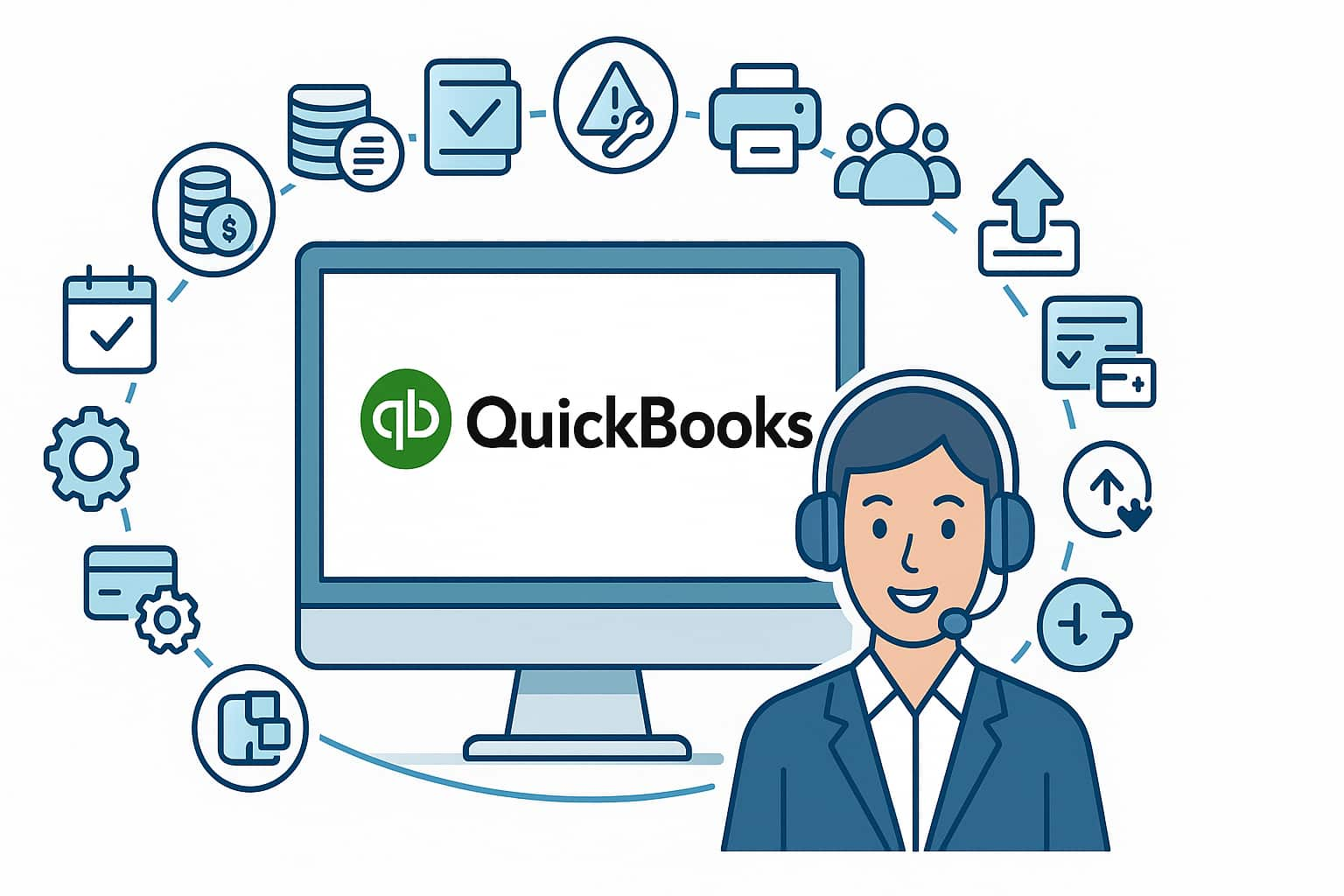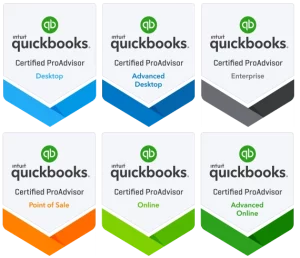QuickBooks Desktop Credit Card Setup Support
Facing issues syncing your credit card with QuickBooks Desktop? Whether transactions aren’t importing, card feeds are broken, or reconciliation just won’t match, our certified QuickBooks experts are here to help.
We offer real-time support to fix credit card connection errors, duplication problems, and feed issues across all QuickBooks Desktop editions — Pro, Premier, Enterprise, and Accountant.

Fix Credit Card Sync Issues Fast
Catch & Correct Transaction Errors
Keep Your Records Secure
Common Credit Card Setuup Problems We Fix With Your QuickBooks Desktop
Credit Card Setup & Sync Issues
- Unable to add or link credit card accounts with the bank
- “Card declined” error during setup despite valid credentials
- OL-222, OL-301, or other sync errors when connecting card feeds
- Credit card feed stops updating or imports incorrect data
- Duplicate or missing accounts after setup or sync
Incorrect Credit Card Transactions & Mapping
- Credit card purchases wrongly categorized or misapplied
- Vendor payments mistakenly linked to credit cards
- Payments recorded under the wrong credit card account
- Liability account misconfigured in the Chart of Accounts
Authorization & Access Restrictions
- Admin permission required to add or manage card accounts
- Multi-user mode blocking credit card setup or edits
- User role limitations preventing access to credit card functions
- Data file issues causing unauthorized card transactions
Payment Processing & Refund Issues
- Credit card transactions stuck in “processing” or incomplete
- Duplicate charges or missing transactions after setup
- Refunds not reflected properly in the register or reports
- Disputed transactions not showing correctly in P&L
Reconciliation Mismatches
- Credit card statements and QuickBooks balances not matching
- Imported credit card charges not aligning with bank records
- Unreconciled balances even after manual matching
Why These QuickBooks Credit Card Setup Issues Need Immediate Support
Credit card setup and usage in QuickBooks Desktop directly affect your cash flow management, vendor relationships, financial reporting, and audit readiness. Even a small error can lead to:
Subscription Issue You Might Encounter: | What It Could Lead To |
Failed Credit Card Payments | ➤ Delayed vendor payments or customer charges damaging business trust. |
Broken Reconciliation | ➤ Inaccurate books, unreconciled balances, and end-of-month reporting errors. |
Import & Sync Failures | ➤ Transactions missed, duplicated, or wrongly categorized due to feed disruptions. |
Incorrect Financial Statements | ➤ Skewed Profit & Loss and Balance Sheet due to mapping or categorization errors. |
Permission or Security Conflicts | ➤ Users blocked from entering or adjusting card data in multi-user setups. |
Disputed Charges Not Handled | ➤ Missing or misclassified refunds leading to compliance gaps and audit risks. |
Mismatched Entries | ➤ Credit card expenses not aligning with bank records, causing downstream accounting issues. |
Your credit card setup in QuickBooks isn’t just a technical preference—it’s a core component of your business finances. Prompt support ensures accuracy, prevents disputes, and maintains trust with banks, vendors, and auditors.
How Our QuickBooks Desktop Credit Card Support Works
Our structured, expert-led approach ensures every credit card issue — whether it’s a failed transaction, syncing error, or reconciliation mismatch — is diagnosed and fixed with accuracy to protect your financial integrity:
-
✅ Step 1: Issue Diagnosis & Data Verification
We begin by reviewing your company file, chart of accounts, bank feeds, and credit card registers. This helps us identify the root issue — whether it’s a sync error, miscategorized entry, or corrupted data link — so we resolve what’s actually broken, not just surface-level symptoms.
-
✅ Step 2: Bank Sync & Feed Restoration
Next, we re-establish secure connections with your bank or credit card provider, fix feed errors like OL-222/OL-301, and repair any broken sync scripts. We also correct import mismatches and prevent duplicate or missing transactions from skewing your records.
-
✅ Step 3: Mapping & Transaction Cleanup
We audit how credit card purchases, refunds, and vendor payments are mapped across accounts. Our experts fix liability account mislinks, misapplied payments, or duplicated entries that can distort your Profit & Loss and Balance Sheet accuracy.
-
✅ Step 4: Reconciliation & Register Fixes
We help reconcile statements with QuickBooks registers by fixing transaction mismatches, adjusting incorrect entries, and clearing unreconciled balances. If needed, we recreate registers, correct ending balances, and align the data for a clean match.
-
✅ Step 5: Permissions, Security & Future Safeguards
Lastly, we ensure your user roles and permissions allow credit card-related functions in multi-user mode. We also activate audit tracking, set up secure backups, and configure alerts to prevent unauthorized transactions or future syncing conflicts.
Methods We Use to Resolve QuickBooks Desktop Credit Card Problems
Our credit card issue resolutions combine Intuit tools, diagnostic methods, and real-time support for fast, secure results:
We use QuickBooks Tool Hub to resolve sync issues (e.g., OL-222/OL-334), login re-authentication failures, and missing transactions in credit card feeds.
We test direct/web connect setups, fix broken bank links (Chase, AMEX, etc.), and address multi-factor authentication or expired login tokens.
Our team resolves rule-based misclassifications, removes duplicate entries, and corrects wrongly applied charges or refunds in the register.
We fix issues where credit card balances don’t match your bank statement—clearing unmatched entries, holds, and delayed postings.
We correct access-level issues by adjusting user roles, file permissions, and linking authorized users to the correct credit card accounts.
For complex or third-party issues (like Plaid or Yodlee), our experts remotely restore your sync, test real-time flow, and validate end-to-end fixes.
Certified QuickBooks Credit Card Setup Experts
Rely on our team of certified QuickBooks ProAdvisors for seamless Credit Card setup, management, and support. With thousands of successful payroll engagements across all fifty states, we deliver expert guidance to ensure your payroll runs smoothly and stays compliant.
Experience peace of mind—let us handle your Credit Card so you can focus on growing your business.

Benefits of Instant QuickBooks Desktop Credit Card Support
Timely support for credit card issues helps prevent transaction errors, financial misstatements, and costly sync delays. Here’s why real-time help makes all the difference:
Avoid Missed or Duplicate Entries
We quickly fix sync issues that can cause missing, double, or wrongly categorized credit card transactions — ensuring your books stay accurate.
Restore Card Feeds Without Delay
Whether your card feed is disconnected, expired, or stuck on “refreshing,” we restore real-time transaction flow to avoid manual entry and errors.
Protect Statement Accuracy & Reconciliation
Our support ensures your QuickBooks credit card balances always match your bank’s — avoiding reconciliation headaches or IRS audit flags.
Prevent Workflow Disruptions
From failed bill payments to blocked vendor transactions, we stop small card issues from snowballing into operational downtime.
Expert Guidance Matched to Your Setup
Our advisors deliver fixes tailored to your edition, card provider, and business workflow — not generic advice or outdated tutorials.
Why Businesses Trust Our Credit Card Support for QuickBooks Desktop?
At eBetterBooks, we specialize in resolving credit card syncing, reconciliation, and feed-related issues in QuickBooks Desktop. Our Certified QuickBooks ProAdvisors ensure secure connectivity, accurate transaction imports, and real-time troubleshooting — no matter your card provider or business setup.
- Experts in Credit Card Sync, Feed & Reconciliation Issues
- Certified QuickBooks ProAdvisors with Card Integration Experience
- Secure Connectivity & Accurate Transaction Importing
- Live Fixes for Critical Banking & Vendor Payment Failures
- Support Tailored to Your QuickBooks Version & Card Type
Ready to Resolve Your Credit Card Issue?
📲 Call Now at +1802-778-9005 or Chat with Our Experts to get immediate assistance.
Call Us Now 💬 Chat With a Live ExpertFAQs – QuickBooks Desktop Credit Card Support
QuickBooks Desktop reconciliation errors typically occur when transactions don’t match the credit card statement due to incorrect mappings, duplicate entries, or unposted charges. Our support team assists with verifying each transaction, correcting mismatches, and guiding you through the reconciliation process step-by-step. This ensures accurate financial reports, audit readiness, and compliance with accounting standards.
Yes, QuickBooks Desktop uses advanced encryption protocols such as SSL and TLS to safeguard your credit card data. However, additional security practices—like using strong passwords, enabling multi-factor authentication, limiting access permissions, and regularly backing up data—are essential to enhance protection. If you're unsure about your data security setup, our specialists can audit and secure your system in compliance with PCI-DSS standards.
Credit card syncing issues in QuickBooks Desktop often stem from outdated bank credentials, third-party integration conflicts, or interruptions in your internet connection. These problems can lead to missing or duplicated transactions, affecting reconciliation accuracy. To resolve them, ensure your QuickBooks and bank feeds are updated, verify login credentials, and reconnect your accounts. For persistent issues, our certified QuickBooks ProAdvisors offer 24/7 real-time syncing support.
Users often experience issues like failed connections, mapping errors, or missing payment entries while integrating credit cards in QuickBooks Desktop. These arise due to misconfigured settings, incomplete setup with merchant processors, or software compatibility issues. Our QuickBooks experts provide secure credit card integration services—ensuring real-time syncing, error-free tracking, and PCI-compliant configuration tailored to your business.
You should reach out to QuickBooks Desktop Credit Card Support if you experience issues like failed payment syncs, reconciliation discrepancies, duplicated or missing transactions, or error codes (e.g., 3120, 179). Certified QuickBooks experts are available 24/7 to offer immediate assistance, ensuring your credit card data remains accurate, secure, and fully integrated with your financial workflow.
